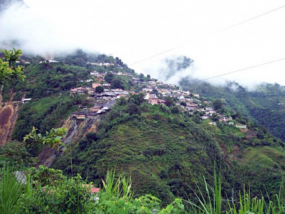Being the President’s cousin would not have had any significance but for his declarations to Al Jazeera where he made some sinister comments related to the interests of the miners and the population of Marmato which is opposed to displacement in the municipality. The following is the text:Some days ago, journalists of Fault Lines, a programme of the international news channel, Al Jazeera, showed up in Marmato to make a documentary related to the town and about what it called the “gold fever in Colombia”. The programme has an interview with Juan Carlos Santos, corporate manager of Medoro Resources and cousin of President Juan Manuel Santos.
J.C.Santos: I like to say, there are government pressures, if you like to call them that way, that can help out etc, I mean we can negotiate, we can compensate them with our… basically with our chequebook, I don’t want to sound overbearing or arrogant but I mean, it ends up being a matter of money basically, also history and a lot of things but basically money. Journalist: Juan Carlos Santos is corporate manager for the Canadian company, Medoro, and relative of the President of Colombia, Juan Manuel Santos. He explained to us how the company was buying all the mines in Marmato for open-pit exploration and the plan for environmental restoration when they are done. J.C.Santos: Simply the company pulls out the chequebook and tells everyone: well, are there 30 families here in this place? Okay. How much does each family want? Journalist: What if they don’t want compensation, if they just want to live in the mountain? J.C. Santos: Well, that will be a huge problem. In Spanish, there is a famous phrase that’s called: “The common rights are always on top of private rights”. I mean when a country like Colombia needs to exploit areas and our country is full of indigenous and Afro-Colombian people, we sometimes have to think in the bigger picture.Then, according to what the President’s cousin affirms, the “common good” is that of Medoro and the “private welfare” is that of the people of Marmato. And, as the public interest prevails over the private one, the land, homes and mines could be taken away from them because the foreign multinational – which is not the country – needs them to develop its open-pit project. Perhaps, all of Marmato could be bought with its chequebook. And if they (the people) do not wish to sell, make use of government pressure? The multinational wants that the arms of the State to be at the service of foreign capital and against an historically peaceful and hardworking people who has contributed much to the country for centuries. Now certainly many Marmatoans understand what is happening in their town. A subsidiary of Medoro has presented more than a hundred administrative appeals at Ingeominas (Colombian institute of geology and mining) for the recognition of its ownership of mining titles that would allow it to keep the mines of Marmato. All of them – Echandía, Cien Pesos and Chaburquía which are legally worked by the miners for more than 15 years and those which are worked and legitimately exploited by the guacheros (a local name for informal miners) for more than four years, which is when the multinational bought the mines and closed and abandoned them, leaving 833 workers and miners in misery. Now the multinational tries to keep the mines so that later on it can close them and proceed with the open-pit mining and, from that, derives its interest in arriving at “agreements with the miners” who legitimately exploit the mines regarding which Medoro, as it has presented administrative appeals, does not have the right to work them – according to the mining code – because it did not exploit them without justification for more than six months. Another grave situation presents itself with the pretensions of the company to exercise domination over Marmato by handing over “donations” for constructing public works which, like the hospital, are obligations of the state. With such “help” the multinational tries to clean up its image and gain support for a vote which would favour it in the prior consultation. The inhabitants of Marmato were also surprised with what happened when scores of police and soldiers turned up at the municipality to support the multinational in opening up a couple of mines which it had been obliged to close in the Cien Pesos sector for acting against the interests of the native miners. And stranger still was that the public forces searched the town people, including nurses, looking for – they said – dynamite. Or was it a campaign to instil fear among the traditionally peaceful population? Or did they want to apply pressure so that the miners would not be able to work for lack of dynamite which, as is known, is not sold to them by the military industry but which, the company says, it could sell to them if and when they accept that the mines belong to them. Is this one of the pressures referred to by the President’s cousin? And which the cousin gave orders for it to be applied? The Marmatoans reaffirm to the national government and to the multinational that Marmato is not for sale and that they will not leave their land for any motive whatsoever.
